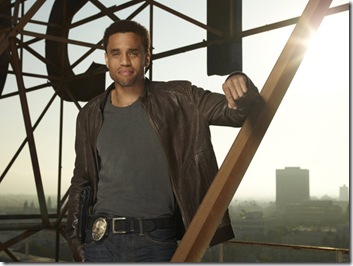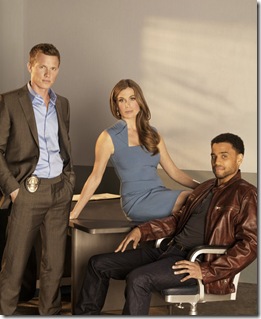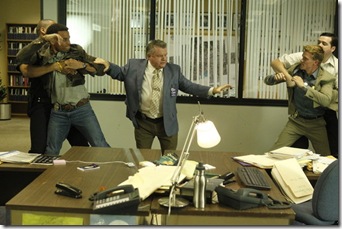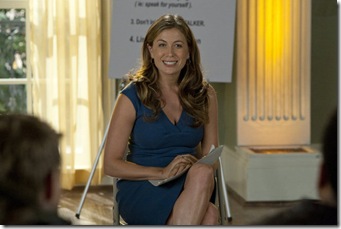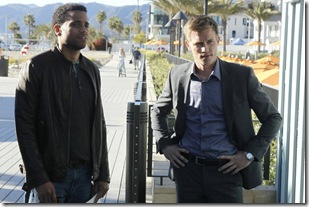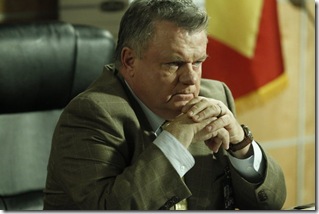USA Network’s Common Law [Fridays, 10/9C] stars Michael Ealy [Think Like A Man, Underworld Awakening] as Travis Marks, one half of the best team of detectives in the LAPD. The problem is that the two have let personal differences grow into a problem of epic proportion – so epic, in fact, that their boss has ordered them into couples’ therapy!
I recently took part in a conference call with Ealy, who talked about the challenge of doing a series in which comedy is a huge component – and how much he enjoyed working on the show’s first season.
How are you doing?
Michael Ealy: I’m good. And you?
Doing good. (I said), I’m glad that we’re finally getting a chance to see it after it’s supposed to coming on in January and then getting pushed back.
Ealy: You and me both.
So I was wondering what do you think the most interesting or entertaining part about your character, Travis, is?
Ealy: Okay. I would say one of the more interesting parts about Travis is his fear of commitment and abandonment. Those two make him a little bit more complex than he seems. So it was more interesting and fun to play him, because there were more layers than just what we see on the surface.
Plus, it’s interesting to see all of his different run-ins with people he’s dated, just at work.
Ealy: Yes, I mean, you know, his dating life is so much more fascinating than mine. And, you know, he just, you know, a lot of that stems from, again, both his fear of abandonment and his fear of commitment, so kind of a catch 22 with him. It really is.
Yes.
Ealy: It’s so much more fun to play.
You have played some really wonderful roles. Sleeper Cell is still my favorite, but I mean you’ve been on The Good Wife and now you’re doing this. I was curious what is it that you look for that makes you pick a role?
Ealy: Good question, you know, for me I’ve always wanted to play a role which impacts. And if you look at a show like Sleeper Cell, obviously, you know, he was, you know, Darwyn was the first African American FBI agent who was a Muslim, who infiltrated a terrorist cell, but his father was a Black Panther. And it was so many layers and it was such a powerful show that was so timely when it happened that, you know, ultimately for me, the role and the show just resonated with impact. And that’s what’s important to me.
The Good Wife, it was important for me to step into a successful show, clearly, and play such a pivotal character. You know, I didn’t come in as an associate. I came in as someone who was responsible for acquiring a firm in a merger and, you know, that was important. That was important. He shook things up in that office and that was important to me.
So, you know, at the end of the day, it’s the same thing with Common Law. You know, for me, you know, Travis, who’s a major part of this show. You know, and he is a part of the unit. The name of the (unintelligible), you know? And I think ultimately, you know, he was a cop, but he is also a detective. He’s a hardnosed detective, but also has a lot of heart and he knows how to deal with people. And he is, you know, one of the most likeable characters I think I’ve ever played.
He is charming.
Ealy: Thank you.
So I mean the timing on this seems…Were you done? I’m sorry.
Ealy: No, I’m done. Thank you.
Okay. The timing on this seems to be so perfect coming off of Think Like A Man being such a huge hit. When you take parts do you think about making things so that your fans follow you from project to project? Because if half the people who went to see Think Like A Man watched this, this is a definite hit.
Ealy: Yes, (unintelligible) to (God) here. You know, I don’t. I don’t try to plan how things are going to line up because ultimately I don’t have any control over that.
If things had gone according to plan, Common Law would have come out first.
Right.
Ealy: So, you know, it’s the studio and the networks pushing and then, you know, all that happened beyond my control and I think it actually worked out better this way. So, you know, I just try to bring my A-game to every single project. And at that point, what happens with the distribution of that project, that’s kind of beyond my control. So I learned a long time ago, don’t try to control what is beyond your control.
Travis and Warren, you both have a really great rapport, you know, on the show and you’re very funny, because I really enjoyed the pilot as well.
Ealy: Thank you.
Did that come easy to the two of you? I mean did you kind of instantly click or did you have to work at that?
Ealy: I hate to say it. Yes, it came easy. We didn’t go on like a retreat, anything like that. We didn’t, you know, go play basketball for a week or anything like. I mean we had nothing in common other than we were both from the, you know, Eastern Maryland-Virginia area, and we were both Redskins fans. And ultimately, you know, but it’s not like we went to a game together and hung out. We just clicked.
I think there’s a certain connection that we both have to the material and our respective roles that end up somehow lining up perfectly and we just clicked. Hats off to USA for casting both of us together and recognizing the chemistry in the room, because it was a long process to find the character of Wes and to find the actor to play the character of Wes. And, you know, Warren and I, it was just easy. I don’t know how to explain it any other way. It just kind of happened. And so, yes, hats off to USA for that.
You know, a lot of people have talked about how funny the show is, and it is very funny. And I think it’s the funniest I’ve seen you on TV. And I was just wondering was it an adjustment for you to be this funny, because usually your roles are so intense and serious, so that’s how I think of you is more intense and serious. Was it an adjustment for you as an actor to be funny?
Ealy: I love you. I love you. It was an adjustment for me. Thank you for noticing. You know, two years ago I decided to diversify my body of work and it was important to try other genres. You know, I did Underworld. I got into the sci-fi. I did Think Like A Man, I got into romantic comedy.
And then, you know, Common Law came along and it was an opportunity for me to broaden body of work in television because I pretty much done mostly drama in television. So it was a big challenge for me and the idea that, you know, it was given to me is false. I had to audition for this role. I had to show the network and the studio that I could do comedy because just like you, no one really thought of me as funny, because I hadn’t shown it, really, in TV or film.
So it was a job that I was actually able to earn and I’m proud of that. And, you know, the comedy has made it the most difficult job I’ve ever had. Because being funny five days a week for 15 hours is the most difficult thing anyone could ever ask of anyone. It’s so hard. It’s harder than any other job I’ve ever had.
And so I’m thrilled that you noticed. I’m thrilled that you thought I was funny. And hopefully people will, you know, begin to open their eyes and see that I have some range, you know, if given the opportunity I can show that.
And was anything particular you had to do from the audition process where you could begin to show that you could be funny and you weren’t like this intense? Because I think a Sleeper Cell, or I think the Good Wife, I think would be fairly intense roles, and you know? So is there anything you did in the audition process to kind of show like, ‘Hey, I can be funny.’
Ealy: Well the good thing about the audition process, and I credit (John Trove) a lot for this, is the audition scene, at the end of the scene he said, ‘Feel free to continue.’
Okay.
Ealy: So, you know, I just improvised or I made up a story or I just kept it going. And I think a lot of that helped kind of (sell) the funny.
And then Think Like A Man was such as hit this past weekend and, you know, upended Hunger Games. Were you surprised by how well the movie did this past weekend?
Ealy: Okay. Who is this? Yes, you know, upended the Hunger Games, it’s funny to me because, you know, it’s was definitely Week 4…
But still, that (unintelligible) is huge.
Ealy: I’ll take it though. Trust me, I’ll take it. I’ll take it.
But, you know, listen, I think we were all a little bit…We knew we had a good movie on hands, because we saw it, you know, a month ago. We knew we had a good movie on our hands. So we were all ready to push it and we all knew it would open well because a lot of people questioned the press that were seeing it were saying, you know, this is a classic. And a lot of the press was relieved to see such a open good movie. Like it just was a good movie at the end of the day. And so we knew we had something special.
The numbers surpassed my number by probably 10 million. I expected 23, we did 33. That’s fantastic. You know, I thought based on what happened, obviously, with Barbershop, I thought, we opened Barbershop with 21 and we got 82 million, domestic. So, you know, I thought this one, ‘Hey, we’ll open at 23, we get to 85, it’ll be good,’ you know? But, you know, we opened at 33 and the sky’s the limit as to how high we can go because people are watching this movie two, three times already.
So I’m thrilled. I’m thrilled. And the timing of it could not be better in anticipation of Common Law. I’m on Twitter. I see the fans saying, “I’m definitely watching.” It’s great timing. It really is great timing.
So I have to say, earlier this week, after my friend saw Think Like A Man, she announced to me today that she was a 100% in love with you and wants to marry you and have your babies. So just so you know, you have a prospect (unintelligible) here in Los Angeles.
And it actually leads to a question, which is there are so many women that love you, and so what in Common Law do you think you’re going to be able to provide for them? And will it involve Sade, perhaps?
Ealy: Well, you know, I’ve always been told by all of my female friends and even the women in my family, that comedy, making a woman laugh, is sexy. So I hope that ultimately, you know, that will be what works for me in Common Law. You know, at the end of the day, listen, Travis is not dominant. So I need people to understand that this is a different role.
But ultimately, you know, Travis is a lovable guy and he’s very sincere. And his fight is can he (unintelligible) to commit. I think people will find him charming and lovable. And at the end of the day, I think, hopefully the laughter will still be sexy. I hope so. We’ll see.
Well, I’m sure my friend will be very happy to watch, repeatedly. So thank you so much.
Ealy: What is her name?
Her name is Jenny. Or you can give her shout out. I think she’d be very delighted.
Ealy: All right. Shout out to Jenny. I appreciate it. Thanks for watching Think Like A Man. I really do. I appreciate it. Check out Common Law, (unintelligible), okay?
So besides the comedy, what do you find the most challenging about the role?
Ealy: I find that dealing, like for me, the most challenging thing was trying to play Travis’s fear of abandonment and his fear of commitment, trying to play it like a Travis way. And that’ll make more sense at the end of the season. But it’s, you know, does have some issues and those issues come out in therapy. And it’s so hard to be vulnerable, especially when you’re a tough detective. But this show is about character. It’s about the characters and Travis has to open up and, you know, I think that was probably the most challenging, is to have those issues kind of just under the surface of every decision that he makes.
What’s it like as an actor to explore a character’s flaws directly in the story through therapy. Is that weird for you?
Ealy: I’m sorry. Say that question one more time?
Yes, what’s it like as an actor to explore a character’s flaws directly in the story through therapy?
Ealy: Eye opening. You know, I said earlier that I never thought therapy was for me, you know, despite maybe 80% of my actor friends do (live in) therapy, I never thought therapy was for me. I never really saw the value in couple’s therapy or any kind of therapy, personally, unless under duress of rape or something like that. But, you know, I think that, you know, discovering Travis’s flaws or his weaknesses or, you know, whatever his issues are, you know, with his childhood and growing up in the foster care system, to discover them through the course of all these couple’s counseling sessions, it was eye opening to me. And ultimately, it had opened my eyes to therapy, and the value of it.
I was under the assumption that therapy was, you know, you sat on a couch and somebody tells you what to think and how you’re all messed up. But it’s the complete opposite of that. And you kind of talk and talk and talk and they ask questions that make you talk. And ultimately you’re kind of able to see for yourself where you’re going wrong. And so it was interesting and helpful, but definitely eye opening.
Well since Travis and Wes are at odds with each other, how do you think the confrontation helps them on the job?
Ealy: Good question. Wow. You know, I think both of them have pretty healthy egos. I think the confrontation grew competition. And anybody who, you know, has a job, including probably his other coworkers. Travis has an ongoing thing that he’s constantly competing for the attention of the captain. So, you know, it just kind of makes it fun, but at the same time, it does lead to them not getting along. They see things differently from time to time.
My question for you is what kind of research went into doing this role initially? Did you talk to any cops or therapists or people that have been doing couple’s therapy?
Ealy: Okay, we worked, we had a consultant with an LAPD detective, 25 years as a detective, who gave us all kinds of hell, and you know, insight and he’s very helpful and helping us understand the difference between what a detective does and what a police officer does.
And also the fun part of the research though was going back into the archives and watching all the great funny top comedies, action comedies, party comedies, from Trading Places, to Stir Crazy to Lethal Weapon to Bad Boyz, to 48 Hours. It was non-couple’s. That was probably the most fun that I had in terms of research because that enabled me to grasp the funny. It enabled me to grasp the rhythm of funny and how you’ve got to keep the tempo up as an actor. You cannot get sluggish with the dialogue, because that’s not comedy.
Yes, and as far as therapy is concerned I went in like a blank sheet of paper. I had no knowledge of therapy. I had my own hang-ups with therapy and I used that as like Travis’s hang-ups with therapy.
Wonderful. My other question for you is real quick. If you can compare the both of you to two characters out there that are frenemies, who would it be and why?
Ealy: What was that question again? Sorry.
If you were to compare the both of you to two characters out there, Travis and Wes, who would they be?
Ealy: Two characters, like on another show or like I don’t understand…
Yes, (unintelligible) another show like a couple out there, so to speak, that have problems and are frenemies and fighting.
Ealy: It’s kind of hard because they’re both, you know, Travis and Wes are both detectives. So I don’t know, to be honest with you. I guess that’s something that’s actually kind of good, I guess, is that there, to my knowledge, there is no other Travis and Wes out there. I can’t think of one.
You know, USA has a track record producing some great television, great casting. Are you excited about that or how do you feel about being a part of all that?
Ealy: You know, when you sign on to a USA show I think you know you’re going to be a part of a certain pedigree that has established itself as the Number 1 cable network. So I wouldn’t say there’s pressure, but you definitely feel like you don’t want to be the one show that doesn’t (unintelligible) up to (unintelligible) expectations, you know what I mean? But I think we’ve got a good one here. I think we’ll fit right in and I think ultimately the fans of USA will be very happy.
Well I agree with you 100% after watching the pilot episode. After the first scene I was sold.
Ealy: Where are you…Oh, that’s great.
(Unintelligible)…I totally enjoyed it completely. I do want to know how much of Michael Ealy is Travis or vice versa?
Ealy: Probably more. You know, Travis’s silly side is definitely me. And that’s the thing that I have not shared with the world, yet. You know, my family can’t wait to see Common Law because they’re like, “Okay. This looks like Michael. Okay, finally. This looks like…” Because I’m a practical joker in my family. I just am. And I am very silly around my family. You know, but they’re very excited to see that side of me and they’re excited so see that side of me in this show.
You looked very comfortable in the part so that’s why I wondered about it. And I’ll be looking forward to hearing later on down the line about some of the practical jokes on set.
Ealy: I appreciate it. Thank you. If I look comfortable, it’s because that was my intent. That was my intent, you know what I mean? I always try, like I model this character after…I made him a mix of Axel Foley and John McClain. And when you watch Eddie Murphy and Axel Foley, he’s in control at all times. Like he’s just laid back and cool and comfortable in his own skin, and I really tried to bring that to the character of Travis. So I’m glad you saw it. I’m glad you liked it. And I think you’d really love this first season. I do.
So when you come into the pilot and the first thing that you see is the two of you are sitting there and you are both kind of uncomfortable, although Warren seems to be much more uncomfortable to be in that space. And you volunteered to share and you know that you two were detectives. You’re not in a partnership, but everybody else is sitting there thinking that you guys are together.
Ealy: Yes.
Where do you guys go from there?
Ealy: Yes, that’s a good one. You know, I think from the very first scene (we’ve) established that these two guys are drastically different. But, you know, it’s a big roller coaster from there. I mean to really answer your question, you know, the therapy sequences, and I didn’t know this when you shot the pilot, but the therapy sequences, and I learned this while we shot it the first week, it really does become the great chorus of the show.
And ultimately, you know, it’s one big roller coaster for these guys and it’s therapy begins to affect the way in which they solve cases. And that just becomes a whole different monster. And I can’t wait for people to really see those episodes, you know? And the way that Travis is in that first scene is, no, he doesn’t want to be there, but the therapist is hot, and that’s all he needs to put a smile on his face. You can’t go home with him. You’ve got a hot therapist.
Why does it kind of…
Ealy: This isn’t going to be so bad.
It almost sounds like you.
Ealy: I mean, you know, listen I must say, you know, as I said before, this show has opened me up to the possibly of couple’s counseling, you know, at some point down the line if I ever need it. But, you know, it wouldn’t hurt to have a hot therapist. It makes the hours go by a lot quicker.
It’s just so fascinating to watch this and see from the diverse characters you’ve played before and see this and see you just kind of roll with it so easily.
Ealy: Oh, thank you so much. I really, really genuinely appreciate that, because nobody saw it coming. And I think that is partially my fault because I haven’t done much comedy. I’ve done so much drama. And yes, but this is more me.
So would that all become more reflective of who you are? Well obviously the series is pretty much shot.
Ealy: Yes. Would it become more reflective of who I am?
Yes.
Ealy: What I can tell you is Travis is pretty consistent. He’s pretty consistent. At a certain point we just had, like when you live in this character for 15 hours a day, 5 days a week, you know, the structure starts to come naturally. It really does. It just starts to come naturally and that was the joy of shooting this show, was I never really got out of character. So being consistent was somewhat easy. And I just, man, you have made my day. Thank you so much and I can’t wait for you to see other episodes. I really do.
You’re welcome. I’m just excited to see this because this another one of these great…I’m a huge fan. I’ve covered a lot of USA shows and this is one of the ones that I’m going to, you know, be passing on to all my friends who, some who are cops and others who just love everything that comes from the USA network, to say, ‘You need to see this.’ So thank you for your time today.
Ealy: Thank you so much. Thank you, Stevie. I appreciate it.
USA Network is really becoming known for its dynamic duos with shows like White Collar and Psych. Can you talk a little bit more about your duo that you’re now a part of? For example, like what makes you two work so well together even at the height of their dysfunction or anger with each other?
Ealy: What makes them work so well together?
Yes.
Ealy: I think, I’ve got to say it’s a deep, dark USA secret. Chemistry is key. Chemistry is key, and I think the chemistry is what really makes the show. It just does. Even when we’re like at each other’s throats, if you’re still rooting for us, that is the USA way. So I don’t know how it happens, but somehow when you see the final product, I works. God bless them.
Definitely. Obviously, we don’t know sort of how they got to this point in the relationship where they are forced into couple’s counseling. Will we eventually see what the foundation is that made them friends and really great partners?
Ealy: Yes, yes, yes. Everything kind of comes out in the first season. Everything comes out in the first season, yes.
In the pilot, which I thoroughly enjoyed, it mentioned that Travis went through something like 18 foster homes.
Ealy: Yes.
And I thought, ‘Wow, that’s more foster homes than birthdays as a kid.’ So what I’m wondering is with this kind of background, what was your entry point into playing that aspect of him as an adult?
Ealy: What was my…
You know, what was the entry point? What was the focal point that got you into playing him as an adult, with all this strange background?
Ealy: You know, the first thing you do as an actor when you start preparing for a role is figure out the character’s background. And one of the things that I do is work real closely with the producers in determining what was Travis’s background. And obviously the 18 foster homes was crucial.
And one of the things that was explained to me is that we’re going to meet a lot of Travis’s foster family members, and that was just beyond exciting for me. Because, you know, I’ve never seen a character like that. I’ve never seen a character with that many mothers. I’ve never seen a character with, you know, so many brothers. And the scene with Money, his Samoan brother, that’s just one small portion of his childhood. And it makes for a much more interesting character, I think, to come from so many diverse backgrounds. The amount of languages that he understands and, you know, you might not be able to speak them all, but you can understand them because he was there long enough.
All of that, to me, makes for a much more interesting, complex and compelling, but also lovable character.
Cool. And what’s it like working with the amazing Jack McGee and those incomparable ladies, Sonya Walger and Andrea Parker?
Ealy: Let me start off with Jack, because he is the king. Jazzy Jack is what I like to call him. And he was a phenomenal cast mate and friend and brother to have on this journey because his seniority, his life story, all of that weighs heavily into who the captain is and who Jack is as a person. And his ability to have the set in shear hysterics in every scene that he does. I mean he just has everybody laughing, off camera and on camera, the outtakes of Jack are phenomenal.
And so I really, you know, as the lead of the show, I really, really enjoyed having him as kind of the senior guy. You know, he was pops. He was the one who, you know, we kind of went to as our father figure. Really, we did, both on an off the show, and off camera.
And Sonya Walger, words cannot express how I feel about this woman. This is our third project together. And I take pride in the fact that I was instrumental in her being on the show. So I mean she is a force to be reckoned with and she brought a certain amount of credibility and strength to this character these derelicts (need baggage) in their lives. So she helped give us balance and that was so refreshing.
And then Andrea Parker, I mean Andy. That’s my girl. I mean she was just on fire in the pilot. She really was. So I hope to work with her again.
First, I’d like to say congratulations of the success of Think Like A Man as well as your upcoming. And so the question I’d like to ask you is with a role like Travis, not really playing towards the stereotypes that you typically find of African American males on TV, what do you think the role of Travis will take to the future of how African American males are portrayed on television?
Ealy: It’s a little muffled, your voice is, so I didn’t quite get the whole question. Can you give it to me one more time, please?
No problem. So with your role as Travis on TV, how do you think not portraying typical stereotypes of African American males, how do you feel that the role of Travis will influence the future portrayals of African Americans on TV?
Ealy: Oh, okay. Well, I don’t think that, and I’m going through the entire season here in my head right now, I don’t think Travis is…I think there’s only one scene where Travis’s color is kind of an issue. And the way in which he takes control of the situation is pretty funny and powerful at the same time. So I don’t think. I’ve got to be honest with you, I don’t think that race was really an issue in this show at all. And I feel like, you know, the portrayal of Travis, I don’t know if it would, to me, the affect it would have on African Americans in television.
I mean I think it’ll have a positive effect, because there’s not much that’s stereotypical about it. He’s a bit more complex than, you know, other characters I’ve played. So I’m just happy to see what the people say, you know? I don’t want to really speculate on stereotypes, but I don’t really see any in this one.
Since people have been talking about therapy, I have to say I really enjoyed seeing the other couples that are in therapy, especially when they start becoming really invested. Can you share anything that, you know, Travis and Wes get into later on in the season, what’s in their therapy session? Any fun things? Just anything you can share.
Ealy: I’m sorry. I hear wind. Could you say the last part of that question again?
Sorry, I’m outside. Can you share anything that Wes and Travis get into later on in the season and their therapy sessions?
Ealy: Sure. You know, ultimately, like I’ve said before, the therapy sessions really become kind of like the Greek chorus of the show, and you know, we begin to work on our cases with whatever therapy is going on in our heads, you understand?
Yes.
Ealy: Whatever therapy lessons are going on in our heads, and so, you know, that to me is the biggest impact of therapy on these guys later on in the season. And I feel like, you know, as far as the other cast mates in therapy, they’re very helpful in helping us kind of find our way. And, you know, there are times when we all team up on Wes, you know? And it’s hilarious. And they end up, you know, there’s times when we have to choose sides, which is, you know, one couple. You have to choose a side and it just gets a little funny. It gets kind of funny, but it’s probably what people are thinking when actual couple’s counseling sessions that they just can’t say. But on this show we just blurt stuff out.
So you mentioned the kind of fun backstage and some of the out takes in that. Can you talk about maybe like a story that something funny that happened backstage, whether it was a prank or an out take or just something that’s fun?
Ealy: Yes. It’s been a minute. Let me think. Oh, okay, one thing. Oh, goodness. I don’t know the name of song. Do you know that song that goes (Humming Song)? Do you know that song?
I’m not sure.
Ealy: Oh, really? Oh my goodness. It’s a great song. I can’t remember the name of it. I’m sorry.
It’s okay.
Ealy: This is one of the things that Warren and I like to do is dance. And sometimes we would make routines up and you know we were sitting in the precinct for so long that, you know, we were just, you know, the crew was getting a little tired so we try to, you know, perk them up with a dance or two. And whether it was a Kid and Play dance or, you know, we would do all kinds of like, I don’t know how to explain. It’s just silly dancing on set.
And I remember one take we were in the midst of, we were in the middle of the take and we had the camera operator ring up that song that I tried to express to you and I can’t remember the name of it. But he had that ring on his iPhone and in the middle of the take, we had him play he song. And we both played it off like, “What is that? What is that?” And then all of a sudden it was like a flash mob. We just started dancing through the song. So it was fantastic. And that’s the kind of silly stuff that we would do with, you know, to have fun on set sometimes.
That sounds like a lot of fun. I hope they show that at some point in the outtakes.
Ealy: I hope so too, because it was funny. It was funny.
Well, I’d like to see it. And also can you talk about any of the guest stars we can see this season?
Ealy: Yes. Greg Germann. Henry Simmons. And Ed Begley Jr., oh my goodness, and I think it’s later in the season, but he is a scene stealer. He just comes in and just blows — I mean we were laughing so hard. I am good at not breaking, when somebody does something funny. I was really good at it. But Ed Begley Jr. had me break up many times, to the point I felt terrible because I was ruining takes. And he is so funny.
Other guest stars, Jeff Fahey. Jamie Hector. Yes, that’s just to name a few right now. I’m going a little blank on the other ones. So those are some of the guest stars.
Oh, I was just asking what can you share about what happens in therapy later on in the (unintelligible)…
Ealy: Oh, definitely. What I said was we begin to solve the cases with whatever we have in therapy in our minds. It can affect us positively. It can affect us negatively. You never know. You know what I mean? And that’s what makes it kind of fun.
And then sometimes we actually interact with the other people in therapy, you know, certain therapeutic exercises and that leads to all kinds of complications. And there’s also, you know, just many moments I therapy where we just, it doesn’t look like we’re going to make it. So, you know, it just gets ugly sometimes.
Yes.
Ealy: So the therapy is a big part of the show and I’m thankful for it because it really does (unintelligible) define…
((Crosstalk))
Thank you, Michael.
Ealy: You’re very welcome.
Photos by Robert Ascroft, Hilary Bronwyn, Frank Ockenfels and Peter ‘Hopper’ Stone/Courtesy USA Network
